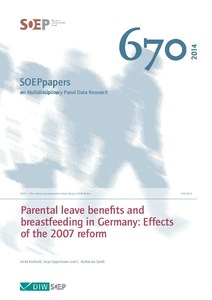Parental leave benefits and breastfeeding in Germany: effects of the 2007 reform
"While the health benefits of breastfeeding for both mothers and children are well known, breastfeeding may make it difficult for mothers to return early to the labor market. Maternity and parental leave regulations have been designed to reduce this conflict. In 2007, Germany put into effect a...
| Main Authors: | , , |
|---|---|
| Institution: | ETUI-European Trade Union Institute |
| Format: | TEXT |
| Language: | English |
| Published: |
Berlin
2014
DIW |
| Subjects: | |
| Online Access: | https://www.labourline.org/KENTIKA-19118004124919362869-Parental-leave-benefits-and-br.htm |
| Summary: | "While the health benefits of breastfeeding for both mothers and children are well known, breastfeeding may make it difficult for mothers to return early to the labor market. Maternity and parental leave regulations have been designed to reduce this conflict. In 2007, Germany put into effect a new parental leave benefit (Elterngeld). The related reform increased the number of parents eligible for benefits and changed the amount and duration of the benefits. The reform sought to decrease the pressure to return to the labor market soon after childbirth, especially for those parents who did not benefit under the old system. The current paper investigates whether this reform of parental leave impacted breastfeeding initiation and duration in Germany. We draw on representative survey data from the German Socio-Economic Panel Study (SOEP) from 2002 through 2012. Three breastfeeding measures are exploited 1) breastfeeding at birth or no breastfeeding initiation; 2) breastfeeding for at least four months; and 3) breastfeeding for at least six months. We find no effect of the Elterngeld reform on breastfeeding initiation or breastfeeding for at least six months, but do find an effect on breastfeeding for at least four months. Applying a difference-in-difference approach, it is shown that mothers who were not affected by the reform did not change their breastfeeding behavior. Breastfeeding duration increased among mothers who benefited from the reform. The results were robust over various sensitivity tests including placebo regressions and controlling for regional indicators, among others. Thus, our empirical results provide evidence that the reform's goal of allowing parents to spend more time with their children during the first year of life also impacted breastfeeding behavior." |
|---|---|
| Physical Description: | 40 p. Digital |

